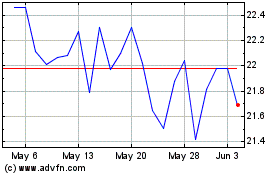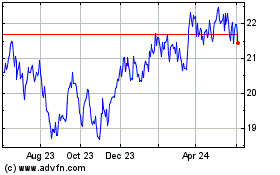UPDATE: Top Court To Consider Corporate Liability In Abuse Cases
18 October 2011 - 4:51AM
Dow Jones News
The U.S. Supreme Court said Monday it will consider a lawsuit
against Royal Dutch Shell PLC (RDSA, RDSA.LN) to decide whether
corporations can be sued in U.S. courts for allegedly aiding
human-rights abuses overseas.
The case examines whether corporations can be held liable under
a 1789 law passed by the first U.S. Congress. The law, the Alien
Tort Statute, allows foreign citizens to file U.S. lawsuits based
on alleged violations of international law.
The law was rarely used for two centuries, but plaintiffs have
relied on it in recent years to target companies for their alleged
complicity in abuses committed in other countries.
The court also agreed to consider a second abuse case, involving
torture allegations against the Palestinian Authority and the
Palestine Liberation Organization, that could affect lawsuits
against corporations.
At issue in the Shell case is a lawsuit brought by a group of
Nigerians from the country's Ogoni region who allege the oil giant
was complicit in human-rights abuses from 1992 to 1995. The
plaintiffs allege that Shell subsidiaries enlisted the aid of the
Nigerian government to suppress local opposition to oil exploration
there. They allege government forces killed and abused Ogoni
residents, and destroyed their property.
Shell has denied the allegations. A Shell spokeswoman said it
would be inappropriate to comment on the matter while it is before
the court.
The Second U.S. Circuit Court of Appeals in New York threw out
the lawsuit last year, ruling 2-1 that corporations can't be sued
under the Alien Tort Statute. The court's majority ruled that
international law does not recognize corporate liability for
international crimes.
Two other appeals courts issued rulings this summer that
explicitly disagreed with the Second Circuit on corporate
liability.
In one case, a Washington-based federal appeals court in July
reinstated a lawsuit by Indonesian villagers that seeks to hold
Exxon Mobil Corp. (XOM) liable for alleged killings and torture
committed by Indonesian soldiers guarding its natural-gas
operations. Exxon has said the claims are baseless.
In a case involving allegations against Firestone Natural Rubber
Co., a subsidiary of Bridgestone Corp. (BRDCY, 5108.TO), a
Chicago-based federal appeals court ruled in July that corporations
can be liable under the Alien Tort Statute. However, that court
proceeded to rule for Firestone on other grounds, saying the
plaintiffs' allegations, involving charges of child labor at a
Liberian rubber plantation, were inadequate.
The Supreme Court will hear oral arguments in the Shell case
early next year, with a decision expected by the end of June. Even
if the high court rules against Shell on the question of corporate
liability, the company still may prevail in the underlying
case.
At the Second Circuit, Judge Pierre Leval was highly critical of
the court's ruling that corporations can't be sued for
international law violations, but he went on to say that Shell
should win anyway. Leval said the lawsuit did not support a
plausible assertion that Shell gave assistance to the Nigerian
military and police for the purpose of facilitating human rights
abuses.
The case is Kiobel v. Shell Petroleum N.V., 10-1491.
In the related Palestinian case, the court will consider a
lawsuit brought by the family of Palestinian-American Azzam Rahim,
who alleged he was tortured and killed while in the custody of
Palestinian Authority intelligence officers.
Palestinian authorities have denied any liability for Rahim's
death.
The justices will use the case to examine a different and more
recent law, the Torture Victim Protection Act, which allows abuse
victims to seek financial damages from individuals who committed
torture. The question is whether the law, enacted in 1992, also
allows claims against organizations.
A federal appeals court in Washington ruled the Palestinian
Authority and the PLO could not be sued because the torture-victim
law only allows lawsuits against natural persons. If the Supreme
Court agrees, such a decision likely would mean that corporations
can't be sued under the 1992 law.
Lower courts have been more willing to allow lawsuits against
corporations under the Alien Tort Statute than under the torture
victim law.
-By Brent Kendall, Dow Jones Newswires; 202-862-9222;
brent.kendall@dowjones.com
Bridgestone (PK) (USOTC:BRDCY)
Historical Stock Chart
From Dec 2024 to Jan 2025

Bridgestone (PK) (USOTC:BRDCY)
Historical Stock Chart
From Jan 2024 to Jan 2025
